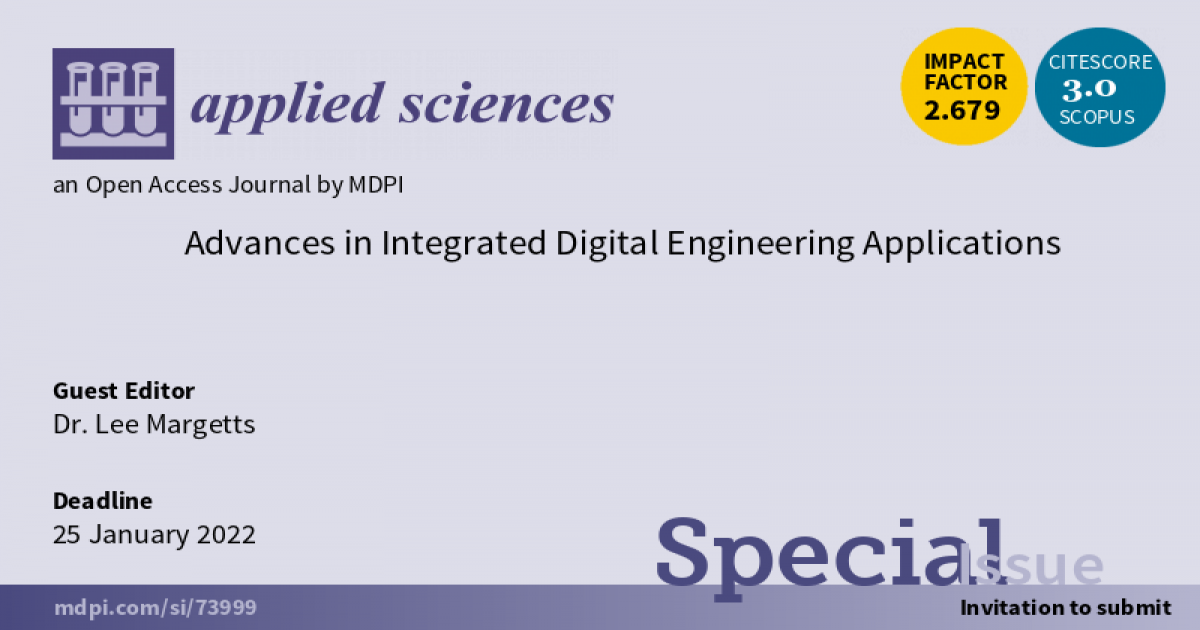- 2.5Impact Factor
- 5.5CiteScore
- 17 daysTime to First Decision
Advances in Integrated Digital Engineering Applications
This special issue belongs to the section “Electrical, Electronics and Communications Engineering“.
Special Issue Information
Dear Colleagues,
To address increasing customer, environmental, and legislative demands, everything we make needs to be re-imagined. Therefore, the importance of digital engineering is more pressing than ever. Beyond the traditional physics-based simulations, engineers are increasingly using more advanced technologies to capture data and craft design in a digitised environment. Through digital test beds, teams can rapidly prototype digital versions of new products, study strengths and weaknesses, seek customer feedback and unlock insights that lead to innovation. Integrated digital engineering applications improve communication, enhance decision making, and foster a more efficient engineering process, supporting the whole product life-cycle from design to manufacture, maintenance and repair, reuse or recycle.
The aim of this Special Issue is to explore the re-engineering of engineering through the integration of advanced digital technologies. Research papers or case studies involving any discipline of engineering are welcome. Topics may include, but are not limited to, the following:
- Cyber-Physical Systems
- Digital Data Capture & Manipulation
- Digital Design, Fabrication, Operations, & Decommissioning
- Digital Twin
- Digital Thread
- Interoperability and Integration
- Internet of Things & Sensors
- Machine Learning & Deep Learning
- Parametric & Generative Design
- Virtual & Augmented Reality
Dr. Lee Margetts
Guest Editor
Manuscript Submission Information
Manuscripts should be submitted online at www.mdpi.com by registering and logging in to this website. Once you are registered, click here to go to the submission form. Manuscripts can be submitted until the deadline. All submissions that pass pre-check are peer-reviewed. Accepted papers will be published continuously in the journal (as soon as accepted) and will be listed together on the special issue website. Research articles, review articles as well as short communications are invited. For planned papers, a title and short abstract (about 250 words) can be sent to the Editorial Office for assessment.
Submitted manuscripts should not have been published previously, nor be under consideration for publication elsewhere (except conference proceedings papers). All manuscripts are thoroughly refereed through a single-blind peer-review process. A guide for authors and other relevant information for submission of manuscripts is available on the Instructions for Authors page. Applied Sciences is an international peer-reviewed open access semimonthly journal published by MDPI.
Please visit the Instructions for Authors page before submitting a manuscript. The Article Processing Charge (APC) for publication in this open access journal is 2400 CHF (Swiss Francs). Submitted papers should be well formatted and use good English. Authors may use MDPI's English editing service prior to publication or during author revisions.
Keywords
- digital engineering
- high performance computing
- artificial intelligence

Benefits of Publishing in a Special Issue
- Ease of navigation: Grouping papers by topic helps scholars navigate broad scope journals more efficiently.
- Greater discoverability: Special Issues support the reach and impact of scientific research. Articles in Special Issues are more discoverable and cited more frequently.
- Expansion of research network: Special Issues facilitate connections among authors, fostering scientific collaborations.
- External promotion: Articles in Special Issues are often promoted through the journal's social media, increasing their visibility.
- Reprint: MDPI Books provides the opportunity to republish successful Special Issues in book format, both online and in print.


